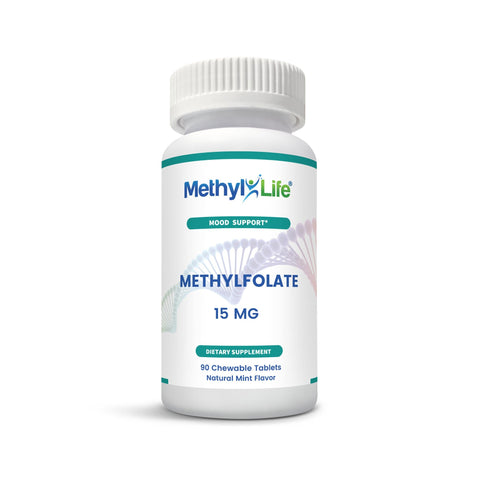
Methylfolate vs. Methylcobalamin

Written By:
Katie Stone - Naturopath
Medical Reviewer:
Kari Asadorian - Bachelor of Science in Nursing
Edited By:
Jamie Hope - Founder of Methyl-LifeUpdated On:
April 28, 2025Table of Contents
What is methylcobalamin?
Methylcobalamin is the natural, biologically active form of vitamin B12. Unlike cyanocobalamin - the synthetic form of B12 - methylcobalamin is absorbed by the body as soon as it is ingested. It requires no further conversion. It goes to work straightaway in all of the bodily processes it is involved in.
Difference between methylfolate and methylcobalamin
Methylfolate and methylcobalamin are both B vitamins and they work together in many processes, but they have many different properties.
Methylfolate is the active form of vitamin B9 (folate). It’s involved in making and repairing DNA, breaking down homocysteine, and synthesising methionine and S-adenosylmethionine. It’s required for the production of neurotransmitters serotonin, dopamine, and norepinephrine, which regulate mood. Most importantly, methylfolate is the only form of folate that can cross the blood-brain barrier, and its bioavailability is much higher than that of folic acid.1
Methylcobalamin is the active form of vitamin B12 (cobalamin). Methylcobalamin works alongside methylfolate in the conversion of homocysteine to methionine. This is a key step in the methylation cycle and critical for maintaining healthy homocysteine levels in the body. This process is also required for the synthesis of S-adenosylmethionine and the subsequent production of neurotransmitters.
Methylcobalamin is also involved in proper red blood cell formation, neuronal function, and DNA synthesis. It is required for the process of myelination, the creation of the protective myelin layer around nerve fibers.
Methylcobalamin is one of the two main types of vitamin B12 used in supplements. The other is cyanocobalamin, a synthetic form of B12. Both have a similar structure, but the key difference is what’s attached to the central cobalt ion.
- Methylcobalamin has a methyl group (a natural compound found in the body).
- Cyanocobalamin has a cyanide molecule (a synthetic form used in fortified foods and lower-cost supplements).
Cyanocobalamin is not naturally found in the body in significant amounts, except in people exposed to cyanide (like from cigarette smoke). The body has to convert this version into an active form before it can be used.
Methylfolate, Methylcobalamin and NAC
Deficiencies in methylfolate and methylcobalamin are associated with various cognitive disorders, including dementia2. This is because both nutrients are needed to reduce homocysteine levels by converting it to methionine. Elevated homocysteine and low methionine is a risk factor for cognitive impairment and dementia.3
Numerous studies show that homocysteine can be lowered by supplementing with methylfolate and/or vitamin B12.4
N-acetylcysteine (NAC) is a form of cysteine that is converted into glutathione (GSH), the body’s major antioxidant that helps protect cells from oxidative stress. NAC also helps the body to flush out homocysteine in the urine.5
When NAC is combined with methylfolate and methylcobalamin, it significantly lowers homocysteine and reduces ischemic white matter atrophy in the brain, which is a hallmark of cognitive decline and dementia.6 This combination is now available as a prescription medical food specially formulated to treat people with mild cognitive impairment.
MTHFR treatment with methylfolate and/or methylcobalamin?
People with MTHFR genetic mutations are recommended to take both methylfolate and methylcobalamin, as the mutation impairs their ability to create methylfolate. Methylfolate and methylcobalamin are both required to metabolize homocysteine and support the methylation process.
By supplementing with readily available forms of both nutrients, the metabolic block is bypassed, allowing homocysteine to be properly converted to methionine.7
Methylfolate vs. methylcobalamin during pregnancy
Both methylfolate and methylcobalamin are important during pregnancy. However, methylfolate is critical for the proper development of the fetus and neural tube, and deficiency can lead to birth defects such as spina bifida.8
Methylfolate is considered the superior form of folate - especially for pregnant women - because, unlike folate acid, methylfolate is readily available to the body without requiring further conversion.
Folic acid is the form most commonly prescribed to pregnant women and used in prenatal supplements, but it may not be suitable for those with MTHFR genetic mutations. Talk to your health professional about supplementing with methylfolate.
Methylcobalamin is also essential during pregnancy as it has a fundamental role in neural myelination, brain development, and growth. Women who are pregnant have higher demands for B12, especially if they do not eat animal products. Like methylfolate, methylcobalamin is absorbed more efficiently than cyanocobalamin, which is beneficial for both mother and baby.
Taking methylfolate and methylcobalamin together during pregnancy has synergistic benefits to mother and baby and has been shown to improve pregnancy outcomes.9
Product Recommendations
L Methylfolate 15 mg - A Mood-Boosting Supplement
$76.00
- Professional Strength - Ask Your Doctor
- High-Dose L Methylfolate 15 Mg for Natural Mood Support2
- 3rd-Party Tested for Purity, Potency & Safety
- 90 Vegan, Non-GMO, Chewable Mint Tablets
Frequently Asked Questions about methylfolate and methylcobalamin
Yes, you can take methylfolate and methylcobalamin together. They are both active B vitamins that bypass MTHFR mutations and other metabolic impairments. Most importantly, methylfoalte and methylcobalamin work together in many biological processes, providing synergistic benefits to mother and baby.
B vitamins cannot be stored in the body so they must be obtained through food or supplements. Both methylfolate and methylcobalamin are in their active form, so they are immediately absorbed and utilized.
Methylfolate is the active form of vitamin B9 and methylcobalamin is the active form of vitamin B12. Although both are required for important processes like breaking down homocysteine, creating neurotransmitters, and supporting cognitive function, each nutrient has its own properties and benefits.
Vitamin B12 works with methylfolate to convert homocysteine to methionine, which is then used to create S-adenosyl-L-methionine (SAMe). SAMe is required to produce mood-supporting neurotransmitters such as serotonin and dopamine.
Taking both B12 and methylfolate helps to maintain normal homocysteine levels and ensures that your body has the nutrients it needs for healthy nervous system function, red blood cell production, good mood, and much more.
Methylcobalamin is unlikely to produce side effects when the recommended dose is taken. However, anecdotal evidence suggests that some people may experience ‘overmethylation’ effects after taking high doses of methylated nutrients. Overmethylation symptoms may include feeling restless, jittery, and anxious. These symptoms usually disspate after reducing or pausing supplementation.
If you experience adverse effects such as nausea, vomiting, diarrhea, headache, dizziness, or an allergic reaction, consult a healthcare professional.
References
-
Richard C Shelton, J Sloan Manning, Lori W Barrentine, Eleanor V Tipa; "Assessing Effects of l-Methylfolate in Depression Management: Results of a Real-World Patient Experience Trial"; The primary care companion for CNS disorders.; 2013 Aug
https://pmc.ncbi.nlm.nih.gov/articles/PMC3869616/
-
Andrew McCaddon, Peter R Hudson; "L-methylfolate, methylcobalamin, and N-acetylcysteine in the treatment of Alzheimer's disease-related cognitive decline"; CNS spectrums.; 2010 Jan
https://pubmed.ncbi.nlm.nih.gov/20397369/
-
Babak Hooshmand, Helga Refsum, A David Smith, Grégoria Kalpouzos, Francesca Mangialasche, Christine A F von Arnim, Ingemar Kåreholt, Miia Kivipelto, Laura Fratiglioni; "Association of Methionine to Homocysteine Status With Brain Magnetic Resonance Imaging Measures and Risk of Dementia"; JAMA psychiatry; 2019 Jul
https://pmc.ncbi.nlm.nih.gov/articles/PMC6659152/
-
Andrew McCaddon; "Homocysteine and cognitive impairment; a case series in a General Practice setting"; Nutrition journal.; 2006 Feb
https://pmc.ncbi.nlm.nih.gov/articles/PMC1395322
-
P Ventura, R Panini, M C Pasini, G Scarpetta, G Salvioli; "N -Acetyl-cysteine reduces homocysteine plasma levels after single intravenous administration by increasing thiols urinary excretion"; Pharmacological research.; 1999 Oct
https://pubmed.ncbi.nlm.nih.gov/10527647
-
William R Shankle, Junko Hara, Lori W Barrentine, Melanie V Curole; "CerefolinNAC Therapy of Hyperhomocysteinemia Delays Cortical and White Matter Atrophy in Alzheimer's Disease and Cerebrovascular Disease"; Journal of Alzheimer's disease; 2016 Oct
https://pubmed.ncbi.nlm.nih.gov/27567825/
-
Doreen Schmidl, Kinga Howorka, Stephan Szegedi, Kristina Stjepanek, Stefan Puchner, Ahmed Bata, Ulrike Scheschy, Gerold Aschinger, René M Werkmeister, Leopold Schmetterer, Gerhard Garhofer; "A pilot study to assess the effect of a three-month vitamin supplementation containing L-methylfolate on systemic homocysteine plasma concentrations and retinal blood flow in patients with diabetes"; Molecular vision.; 2020 Apr
https://pubmed.ncbi.nlm.nih.gov/32355442/
-
Nathalie Irvine, Gillian England-Mason, Catherine J Field, Deborah Dewey, Fariba Aghajafari; "Prenatal Folate and Choline Levels and Brain and Cognitive Development in Children: A Critical Narrative Review"; Nutrients.; 2022 Jan
https://pmc.ncbi.nlm.nih.gov/articles/PMC8778665
-
Emma M Lascar, Nicole M Warner, Michael J Doherty; "Pregnancy outcomes in women with epilepsy and MTHFR mutations supplemented with methylated folate and methylcobalamin (methylated B12)"; Epilepsy & behavior reports; 2020 Dec
https://pmc.ncbi.nlm.nih.gov/articles/PMC7776832/

About the Author
Katie is a qualified Naturopath (BNatMed) and freelance writer from New Zealand. She specializes in all things health and wellness, particularly dietary supplements and nutrition. Katie is also a dedicated runner and has completed more half-marathons than she can count!
Related Articles

Hydroxocobalamin Vs. Methylcobalamin for MTHFR: Which is Better?
Written By: Katie Stone - Naturopath

Like what you read?
Please subscribe to get more content like this sent to your inbox.
Share This Article
Browse Categories
Product Recommendations
L Methylfolate 15 mg - A Mood-Boosting Supplement
$76.00



